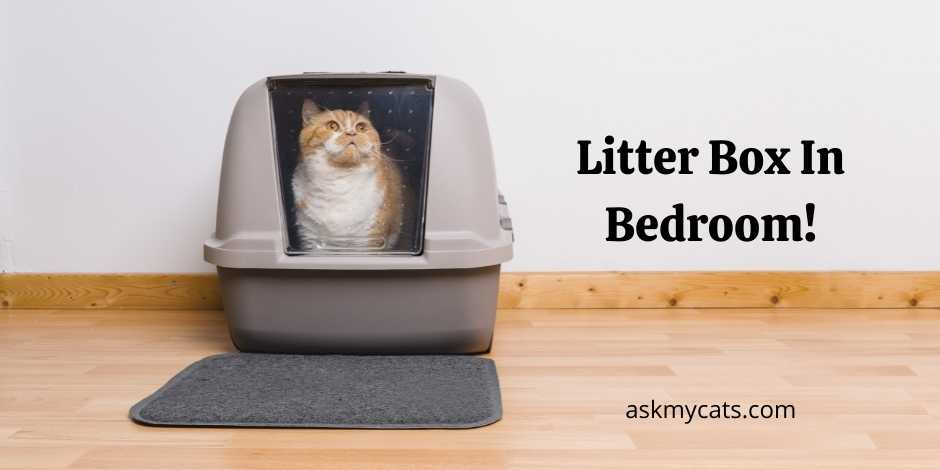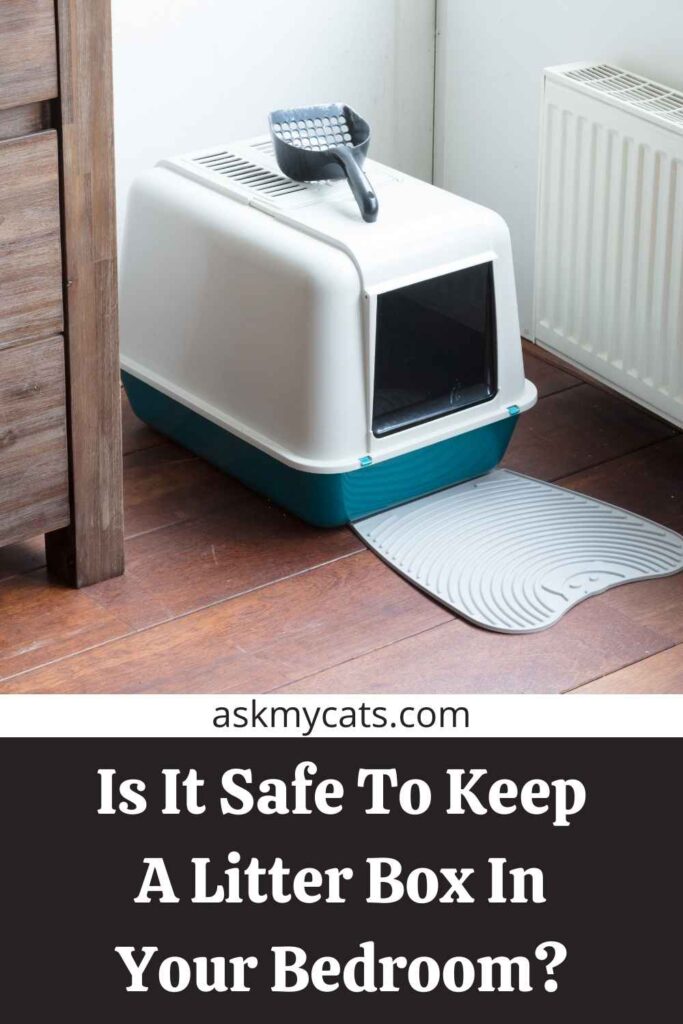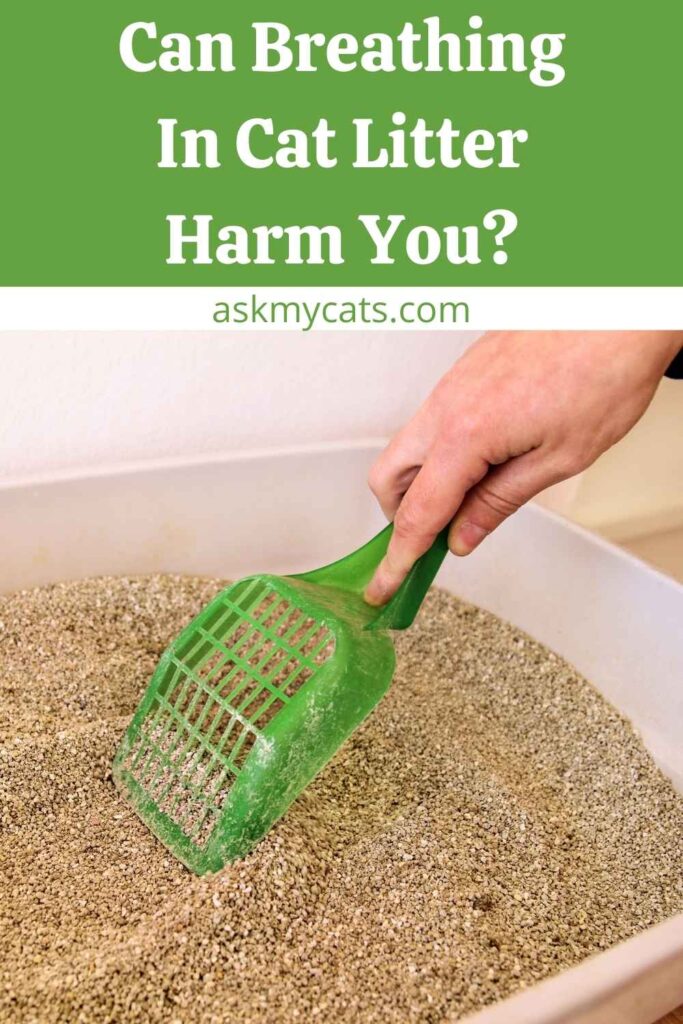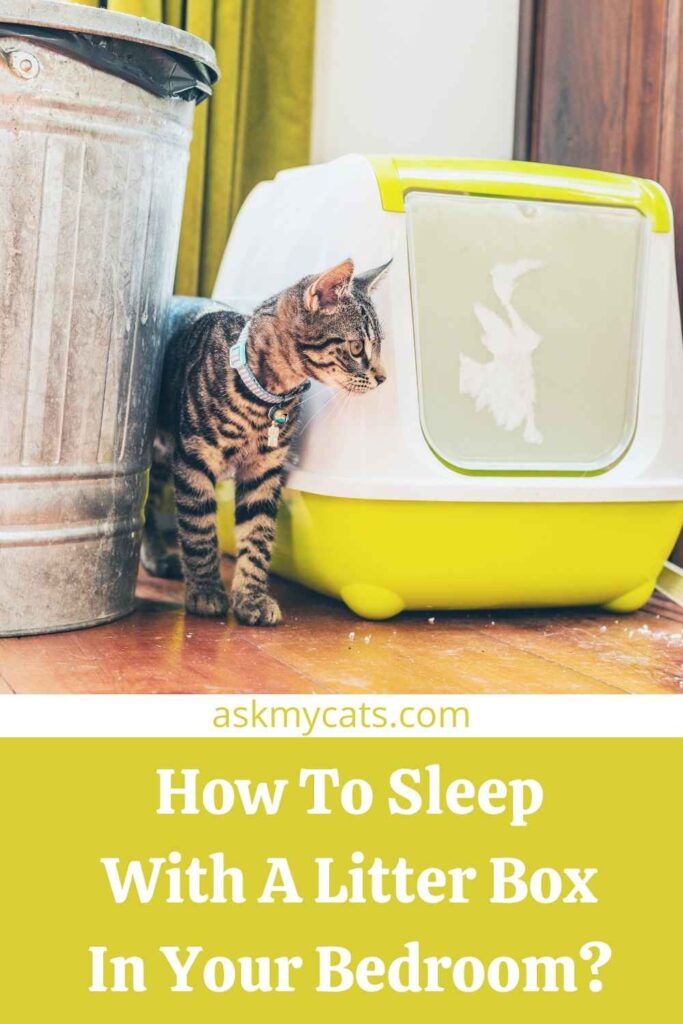A cat’s litter box is an essential element of owning a cat. Cats are naturally highly clean creatures, and they will spend up to a third of their lives cleaning themselves painstakingly and methodically.
If possible, keep the litter box out of the bedroom unless the room is spacious and the litter box can be positioned well away from the bed and out of the way. Place the box in a bathroom, closet, or laundry room instead.
However, never put your hand near your cat’s food or drink since this may discourage your cat from using the litter box.
If you have no option but to maintain a litter box in your bedroom, it is advised that you clean it at least once a day to avoid any hazardous smells from the urine and excrement (depending on how many cats use it).


Give Your Cat the Perfect Day
Get the Free Ebook!
Is It Safe To Keep A Litter Box In Your Bedroom?
It is absolutely not safe to keep a litter box in your bedroom.

Unfortunately, there are health hazards linked with dirty cat litter. While these risks are minor for most people, they are substantial for pregnant women, and other vulnerable individuals, such as children and the elderly, and cat owners should be aware of them.
Toxoplasmosis is a parasitic illness caused by the Toxoplasma gondii parasite, one of the most widespread parasites on the planet.
When you scoop out filthy cat litter or replace the cat litter, the organism can be transported through the air, which can have hazardous consequences.
Cats also excrete the eggs of other parasitic parasites, such as roundworms, which can infect people.
Toxoplasmosis may cause serious illness in various people, but children are particularly sensitive and can be readily afflicted.
There are considerable additional dangers for pregnant women since Toxoplasmosis can cause pregnancy difficulties, including an increased chance of miscarriage, and has been associated with several birth malformations.
Other vulnerable persons are those who have a weaker immune system, such as those who have HIV or are undergoing chemotherapy or those who have just undergone surgery.
The only method to reduce the danger is to remove your cat’s feces daily and to do it gently.
Once your cat has discharged the parasite, it can take several days to mature, so making sure you clean the cat litter box daily can help reduce the chance of infection.
However, due to a lack of space for cat supplies and extra litter, you may believe that the best location for your cat’s litter box is in your bedroom.
However, it would be best to realize that putting it in that tight place isn’t a smart idea. Dirty cat litter poses a health danger.
Can Breathing In Cat Litter Harm You?
Yes, breathing in cat litter may harm your health.

It’s easy to get immersed in a cloud of cat litter dust while scooping the litter or pouring a new batch into the box. Not only may we admit to inhaling cat litter dust by mistake, but we are also continually exposed to small particles prevalent in the air.
We offer anything in the air around us a direct road to our lungs whenever we breathe it. It is quite disturbing to know that trash contains proven carcinogens and irritants and that these substances may sit within our lungs.
With several components in cat litter having the potential to make people sick in the future, it’s evident that inhaling cat litter dust is hazardous to both humans and cats.
Though becoming sick from cleaning your cat’s litter box is exceedingly unlikely, there is a slight danger of getting sick from cleaning your cat’s litter box.
While frequent exposure to the toxins is more likely to cause sickness in the long run, some immunocompromised persons may be in danger with each cleaning.
The following are some of the threats that can be found in a cat’s litter box:
- Irritating fragrances
- Harmful bacteria
- Ammonia
- Intestinal parasites
- Carcinogens
- Toxoplasmosis
If you’re an immunocompromised person cleaning out a litter box, you should be particularly cautious of the risks lurking inside; however, being ill as a result of cleaning your cat’s litter box is quite improbable.
The majority of the dangers associated with cleaning your cat’s litter arise from long-term exposure to known carcinogens.
Toxoplasmosis is one of the most well-known risks associated with cat litter exposure.
Toxoplasmosis is recognized to be particularly dangerous to pregnant women and immunocompromised people. Infections from breathing in the litter are uncommon, although they can happen.
However, contact with infected feces is the most prevalent way to get toxoplasmosis. The person cleaning the litter box will unintentionally acquire contamination on their fingers, which will cause them to wipe their eyes or mouth.
It’s best to keep all pregnant ladies and immunosuppressed people away from the litter box to be as safe as possible.
Also, check out is it safe to breathing in cat litter when pregnant
How To Sleep With A Litter Box In Your Bedroom?
If you are sleeping with a litterbox in your bedroom, cover it well so that unpleasant odors don’t affect your health.

It’s not a good idea to have your cat’s litter box in your bedroom. The odor is unpleasant, and the package is filthy. If you don’t have any other choices, take a few precautions to reduce the influence of the litter box on your olfactory sensibilities and ability to sleep.
Keep the litter box as far away as possible from your bed. Place the litter box on a sturdy surface that can be easily removed and cleaned. A tarp, a piece of linoleum, or a plastic or rubber mat, for example, can help control spills and trash tracking.
You could wish to hide the litter box behind a beautiful screen, plants, or a piece of bedroom furniture, both to hide it and to offer your cherished cat much-needed solitude when using it.
Cats prefer to have their litter boxes in a peaceful place with several escape routes, so make it as simple as possible for them to access their litter box.
Keep their food and water bowls in a different spot since they don’t want to eliminate them near where they eat.
You may purchase professionally created furniture with a compartment for holding a litter box, such as tiny tables. Litter box furniture helps conceal the box, helps confine clumps of litter, and lessens the look and smell of litter box activity.
Using a covered litter box is a comparable and less expensive option. To assist decrease box smells, several models have charcoal-activated odor-absorbing filters. Baking soda, for example, may be used to deodorize cat litter at home.
Just make sure your cat’s litter box is large enough. Many cats prefer larger boxes with more space to roam about in.
How To Hide Litter Box In Bedroom?
If you have a more private area in your room, keep it as far from where you sleep as feasible in a closet or corner. You could also want to consider getting some litter box furniture, which will conceal your cat’s litter box and keep it covered.
It’s much more crucial to keep the litter box clean if you sleep near it. You may even invest in an automated self-scooping litter box, so you don’t have to bother about it. Even if your cat poops while you’re sleeping, the poop will be scooped up soon.
If your cat uses a covered litter box, consider using an enclosed box to keep a lot of the cat litter from flying around. This can help protect you from ammonia poisoning and infections caused by cat feces.
Frequently Asked Questions
Where do you put a litter box at night?
You may put the litter box wherever you like, regardless of where your cat sleeps, and when you’ve introduced her to it, she’ll discover and use it (as long as you don’t keep moving it discreetly). She doesn’t want to share a room with it any more than you want to share a bathroom with it.
Is it bad to breathe in cat litter?
Litter boxes that aren’t cleaned frequently can accumulate urine and feces, releasing toxic ammonia smells. The ammonia might irritate the bronchial membranes in your lungs, resulting in a lot of coughing and significant tissue damage in your trachea and lungs.
Can you get sick from having cat litter in your room?
When a cat litter box becomes unclean and loaded with pee and excrement, ammonia builds up. This might lead to overexposure, which can induce moderate symptoms, including headaches and nausea in humans. However, keeping the litter box clean regularly can help avoid this.
Final Words
Sleeping near your cat’s litter box is not a good idea, but if you absolutely must, make sure you take the necessary steps to minimize your exposure to litter and waste.
Ask your questions in the comments section below.
